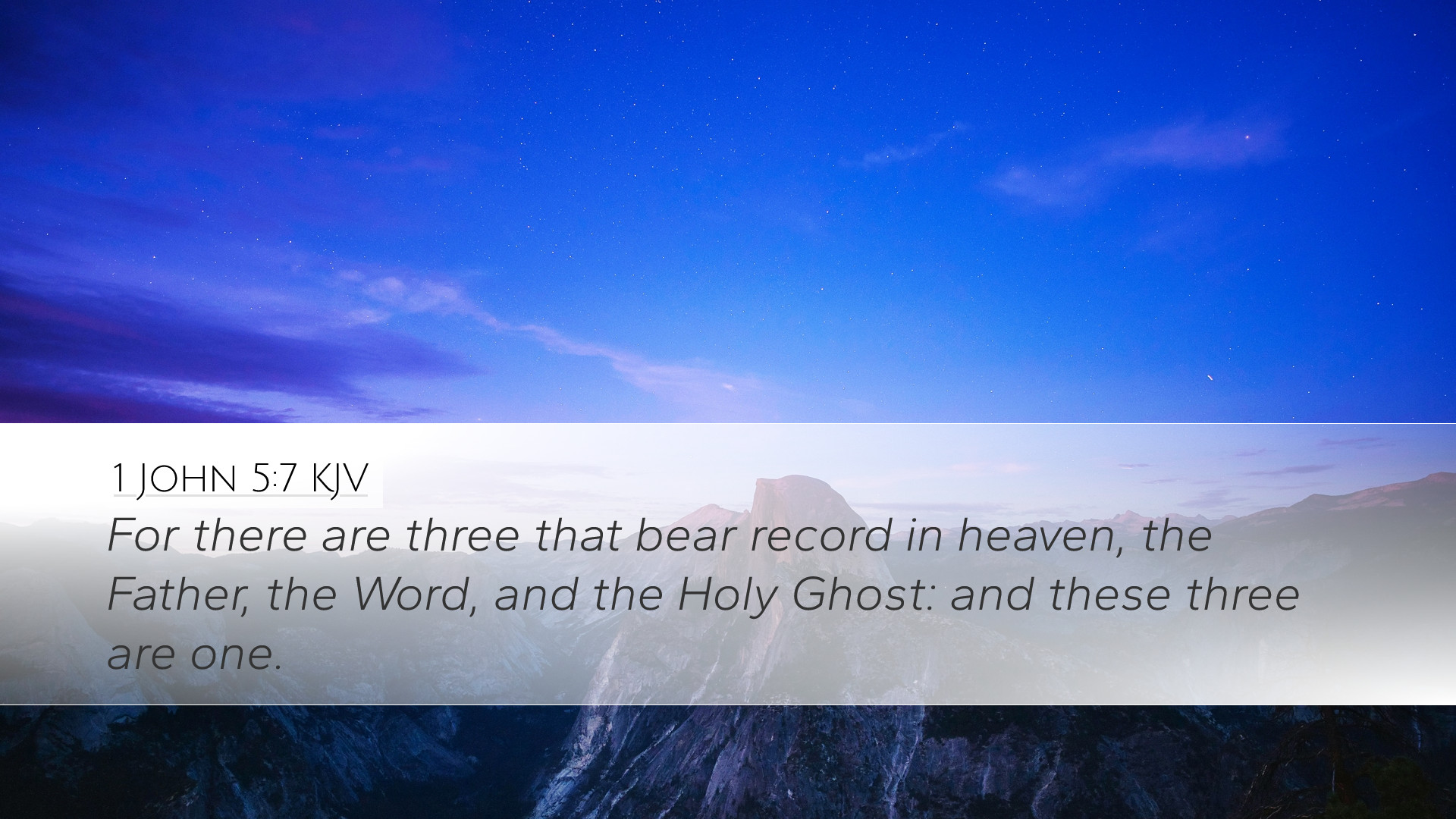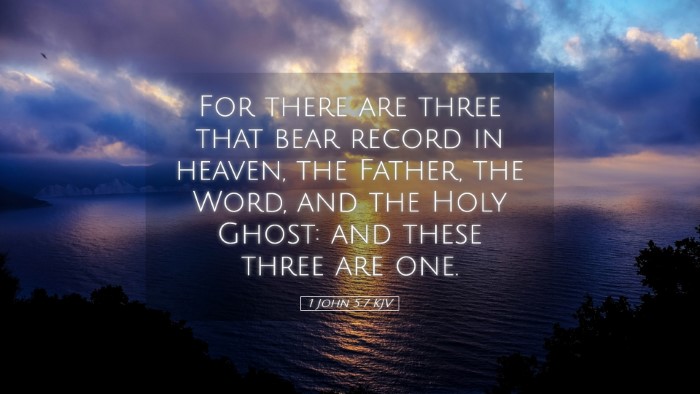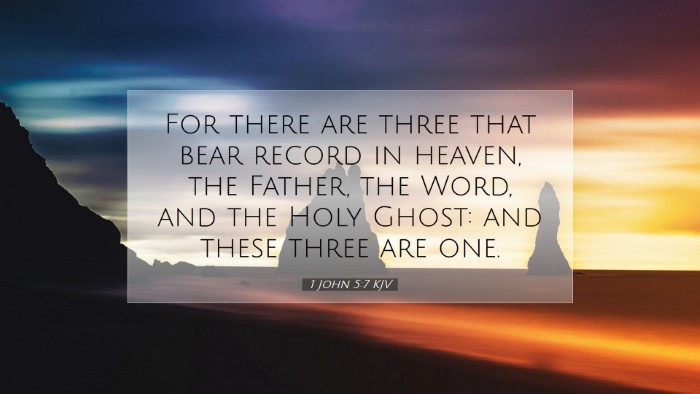Old Testament
Genesis Exodus Leviticus Numbers Deuteronomy Joshua Judges Ruth 1 Samuel 2 Samuel 1 Kings 2 Kings 1 Chronicles 2 Chronicles Ezra Nehemiah Esther Job Psalms Proverbs Ecclesiastes Song of Solomon Isaiah Jeremiah Lamentations Ezekiel Daniel Hosea Joel Amos Obadiah Jonah Micah Nahum Habakkuk Zephaniah Haggai Zechariah Malachi1 John 5:7
1 John 5:7 KJV
For there are three that bear record in heaven, the Father, the Word, and the Holy Ghost: and these three are one.
1 John 5:7 Bible Commentary
Commentary on 1 John 5:7
Verse Reference: 1 John 5:7: "For there are three that bear record in heaven, the Father, the Word, and the Holy Ghost: and these three are one." (KJV)
General Overview
This verse is one of the most significant in the New Testament regarding the doctrine of the Trinity. Its inclusion of the Father, the Word (Jesus Christ), and the Holy Spirit as the three that bear witness in heaven provides a definitive statement about the unity and co-equality of the divine persons of the Godhead.
Insights from Matthew Henry
Matthew Henry comments on the necessity of the witness of God regarding the truth of Christian doctrine. He emphasizes that the unity of God’s witnesses — the Father, the Word, and the Holy Ghost — signifies their complete cooperation in the work of salvation and revelation.
Henry stresses that this verse affirms the divinity of Christ and the Holy Spirit, arguing that their equality with the Father is critical to understanding the fullness of God’s revelation. The divine essence is shared, which ensures that those who believe in Christ are also embracing the full truth of God's nature.
In conclusion, Henry argues that this passage underlines the importance of the witness of the Holy Spirit in the believer's life, confirming their relationship with Christ and conviction in faith.
Insights from Albert Barnes
Albert Barnes provides an analytical interpretation of this passage, highlighting the textual challenges surrounding it. Barnes notes that while some manuscripts do not specifically include this verse, the doctrine it presents is consistent with other scripture passages that affirm the Trinity. He points out cross-reference verses that echo the elements found here, further supporting the belief in the united essence of God and the distinct persons of the Godhead.
Barnes elaborates on the significance of "bear record in heaven." He believes this indicates God's ultimate authority and the comprehensive nature of His revelation to humanity. The collaborative function of these three persons indicates a harmony in purpose and existence.
Furthermore, he insists on the necessity for Christians to understand the role of each person in the Godhead: the Father as the creator, the Word as the incarnate truth, and the Holy Spirit as the empowerer of believers. This scripture serves as a fundamental text for apologetics on the doctrine of the Trinity, clarifying that while they are distinct, they are indivisible in their essence.
Insights from Adam Clarke
Adam Clarke delves into the theological ramifications of 1 John 5:7, commenting extensively on the concept of divine witness. He asserts that the verse underscores that God’s testimony is crucial for believers, highlighting the necessity of divine affirmation in matters of faith.
Clarke remarks upon the profound message contained within the unity proclaimed in this verse. He believes that the phrase "these three are one" encapsulates the essence of co-equality, which should not be neglected in theological discussions. Clarke encourages readers to appreciate the implications of this unity concerning Christian fellowship and individual believers' relationships with God.
As with the other commentators, Clarke underscores that this passage illustrates the systematic approach to understanding God’s nature. He calls on scholars and theologians to take a comprehensive view of God’s revelation through Scripture, aligning it with the experience of believers empowered by the Holy Spirit as they live out their faith.
Theological Implications
The significance of this verse resonates beyond historical commentary; it has extensive doctrinal implications. As highlighted in the commentaries, this directly influences the discussions surrounding the Trinity within Christendom. The acknowledgment of the equality and unity of the Father, the Son, and the Holy Spirit challenges any perspectives that propagate a hierarchy within the divine persons.
The unity expressed in 1 John 5:7 also serves as a basis for the Christian understanding of community. Just as the Father, Son, and Holy Spirit exist in unity, Christians are called to live in fellowship with one another, reflecting that divine relationship through love, mutual support, and collaboration.
Moreover, for pastors and theologians, this passage reinforces the importance of the Holy Spirit's role in affirming truth. The believer’s experience of the Holy Spirit is fundamental to understanding their relationship with God, marking a vital aspect of Christian doctrine and practice.
Conclusion
In conclusion, the insights from Matthew Henry, Albert Barnes, and Adam Clarke collectively reinforce the theological weight of 1 John 5:7. This verse encompasses key elements about the nature of God that have far-reaching implications for theology, worship, and the practical outworking of faith in community. Understanding these insights enriches the study of God’s Word and strengthens the foundation of Christian belief in the unity and distinctness of the divine persons of the Trinity.


